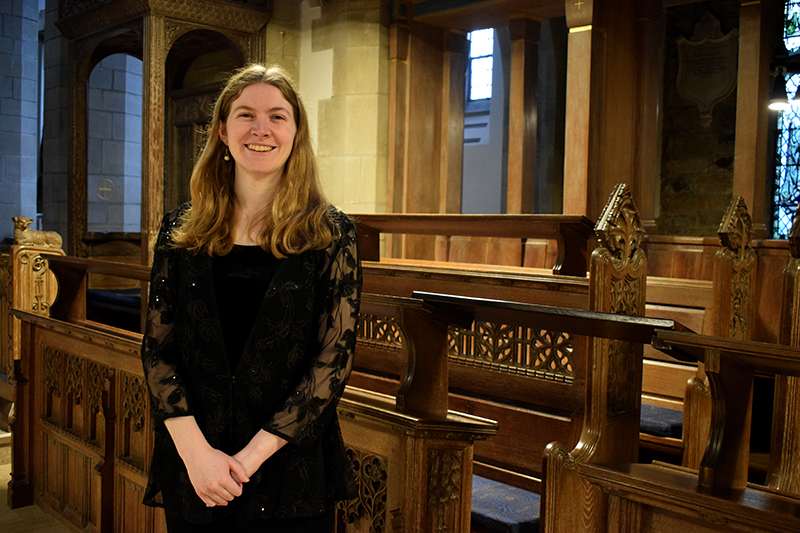On Wednesday 5th April 2023 we welcome Carolyn Craig of Westminster to the Cathedral for our next organ recital of 2023. In this edition of ‘Notes from an Organist’ we discover more about studying in Vienna, the difference musically between the UK and the US, and how the recital will take you on a Lenten journey.
Could you introduce yourself, how you got into music / become an organist and your musical journey to where you are today?
Hello! I’m an American organist, and am currently organ scholar at Westminster Cathedral. I come from a musical family, and was inspired by the organ as a chorister at my local church.
I first came to the UK in 2018, after graduating from Indiana University, and was organ scholar of Truro Cathedral. I absolutely fell in love with the rhythm of life in the Cathedral, and was so excited to have a job that involved so much musicianship and teaching. After that experience, I went back to Yale, where I earned a Master of Music and a Master of Musical Arts in Organ, but I knew that I wanted to come back to the UK and to cathedral music. I am thrilled to be here now!
What can people expect from your recital at Bradford Cathedral?
The programme is conceived as a Lenten journey from darkness ultimately into light. The programme incorporates recognisable melodies from Protestant and Catholic traditions, and includes mainstays of organ repertoire as well as pieces that audiences may not have heard before.
Why do you enjoy playing the organ?
The organ is such a versatile instrument, and can be so incredibly powerful or so exquisitely delicate. I love how the performer gets to orchestrate each piece, and how the differences of each instrument invite the performer’s creativity.
Do you have a particular favourite piece out of those you are playing?
It’s difficult to decide! Either Eugénie-Emilie Juliette Folville’s simple, well-crafted verset on the “Tantum Ergo Sacramentum”, or Florence Price’s virtuosic “Finale” from Sonata No. 1.
This recital season we are celebrating music written by female composers. Which piece(s) have you selected, and why did you choose it / them?
Some of the pieces I chose were introduced to me by Amplify Female Composers’ Organ Meditations on The Stations of the Cross. Smyth’s Prelude and Fugue on “O Traurigkeit, O Herzeleid” is in the German Romantic tradition, drawing on a Lenten Lutheran chorale. Assandra’s “Ave Verum Corpus” and Folville’s “Verset sur le thème du ‘Tantum’, 6e ton” focus on the Last Supper and on the Eucharist. Bracquemond’s Suite sur la Passion vividly sets Christ’s journey from Gethsemane to the tomb. The final piece on the programme, Price’s “Finale” from Sonata No. 1, can be seen as connecting crucifixion to resurrection through showing the transformation of musical material from tortured to triumphant. I know it’s a little early, but I wanted my audience to be able to enjoy the rest of their afternoons!
You studied organ with Ulrich Walther and Johannes Ebenbauer. What was that experience like?
Both are fantastic teachers! I loved studying in Austria and having lessons in German, even if I didn’t understand every word (as Ebenbauer discovered when I translated for a public organ demonstration). In Vienna, I studied on the oldest functioning organ in Vienna, a restored 1642 Wöckherl instrument, which Froberger would have known, and practiced regularly on a restored 1780 Sonnholz. Those were my first experience with mean-tone organs with short-octaves and subsemitones, and it was really special to learn e.g. Froberger and Muffat on those instruments. I also loved happening upon historic instruments in random places—my flatmate’s mom played at a small village church where the bellows could still be manually pumped!
Have you found any differences playing music in the UK to the US?
Yes, definitely! This is a generalisation, but I think one of the fundamental differences is that in the UK, in cathedral music especially, organists have to learn very many pieces very quickly, whereas in the US, we have fewer services and probably spend more time on each piece. This observation reflects wider musical trends in each country, and both approaches have their pros and cons.
You co-created ‘Amplify Female Composers’. Could you tell us a little about that group?
Amplify Female Composers came about in late 2020, in a time when lists of great music by women composers were circulating, but when it was difficult to find performances of some of these works. Janet Yieh and I co-founded Amplify Female Composers in order to encourage and curate performances of choral and organ works by women, all archived on our YouTube page. Our inaugural project was an Advent Calendar Project, which featured 25 different university, cathedral, and parish choirs performing Advent and Christmas pieces by women, December 1-25. Other projects include organ and choral curations for Lent and Easter; the Advent Calendar Project 2.0; a Demessieux Centennial collaboration with the Boulanger Initiative; and “Fall Female Composer Fridays” collaboration with the Choir of Trinity Wall Street and A Great Host of Composers. You can find out more on the website.
You’re also involved with ‘A Great Host of Composers’. What does that involve?
A Great Host of Composers is a database that suggests choral pieces by women for every Sunday and Feast Day in the 3-year Revised Common Lectionary. Entries include voicing, length, difficulty, recordings, link to score/link to purchase score, etc. This is an incredible resource! You can find out more on the website.
Finally, how would you sum up your upcoming recital at Bradford Cathedral?
A varied programme, exploring Holy Week in many eras and cultures. Hopefully, an ultimately uplifting experience!
You can join us on Wednesday 5th April at 1pm for Carolyn Craig’s organ recital, with an optional £4 buffet lunch beforehand at 12:30pm. You can find out more about Carolyn on their website.
You can discover more about our organ recital season on our dedicated page

